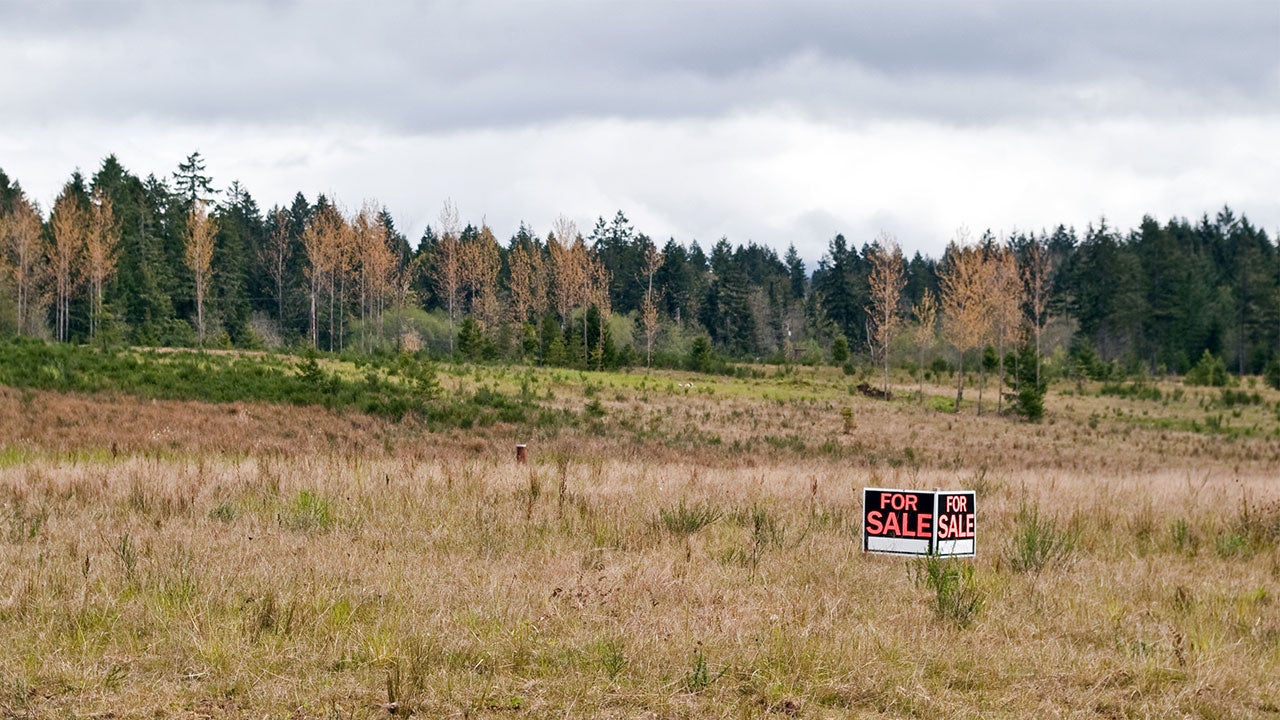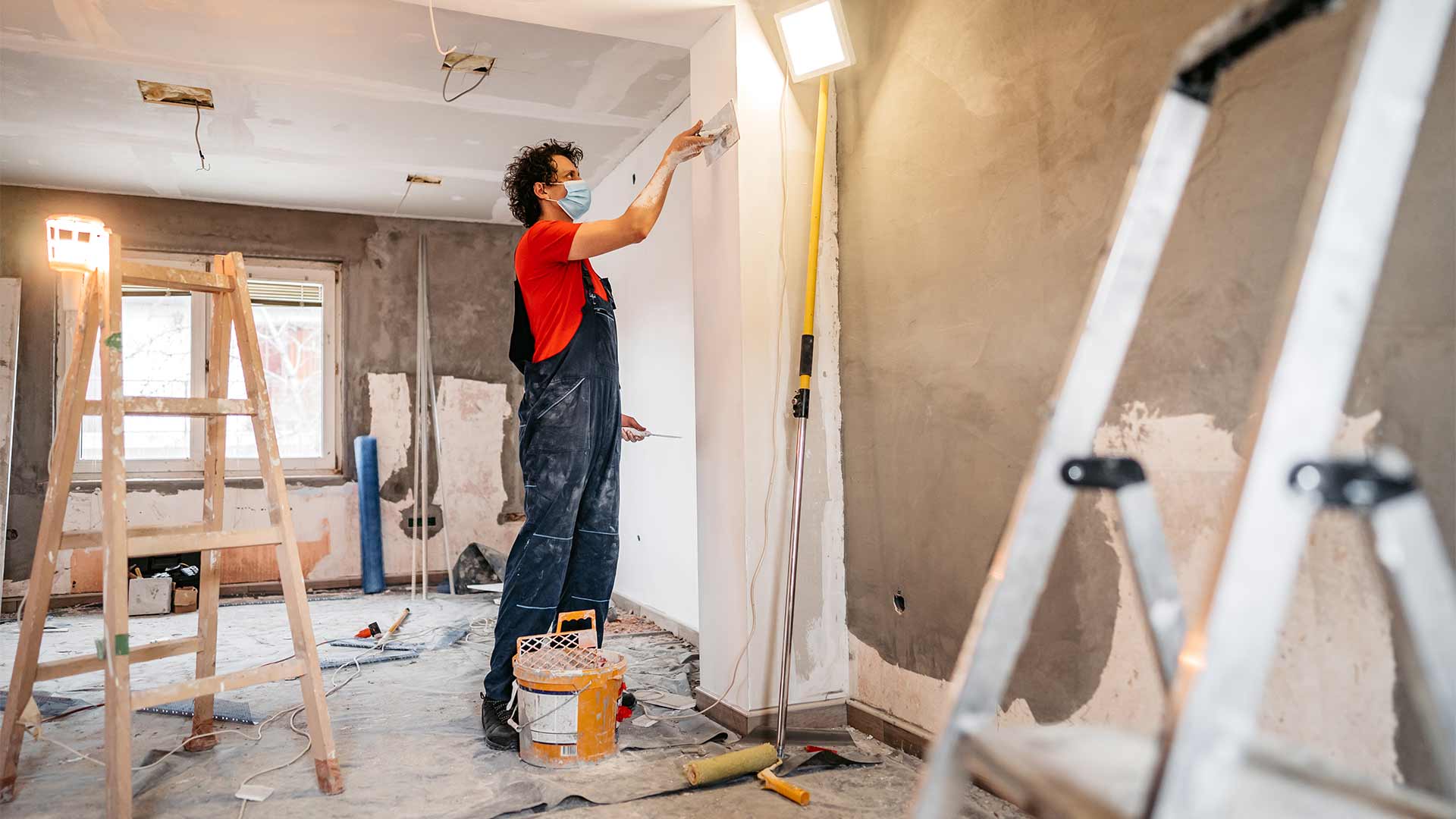Home>Finance>How To Buy Land With Bad Credit And No Money Down


Finance
How To Buy Land With Bad Credit And No Money Down
Modified: March 10, 2024
Learn how to finance your land purchase, even with bad credit and no money down. Get expert tips and advice on buying land with alternative financing options.
(Many of the links in this article redirect to a specific reviewed product. Your purchase of these products through affiliate links helps to generate commission for LiveWell, at no extra cost. Learn more)
Table of Contents
Introduction
Buying land is a dream for many people. It offers the opportunity to build your dream home, start a business, or invest in a valuable asset. However, if you have bad credit and no money for a down payment, it may seem like an impossible feat. Fortunately, there are strategies and options available that can help make this dream a reality.
A land loan is a type of financing specifically designed for the purchase of undeveloped land. Traditional lenders, such as banks and credit unions, typically have strict requirements for borrowers, including a good credit score and a substantial down payment. But don’t worry if your credit score is less than stellar and you don’t have a chunk of cash saved up. There are alternative approaches that can help you overcome these obstacles.
Before diving into the options, it’s essential to evaluate your creditworthiness. This involves obtaining a copy of your credit report and reviewing it for any errors or negative marks. Taking steps to improve your credit score will not only increase your chances of securing a land loan but also potentially qualify you for better terms and interest rates.
One of the most sought-after options for buying land with bad credit and no money down is finding a seller who is willing to finance the purchase directly. This can be done through owner financing or lease-to-own agreements. These arrangements allow you to make payments directly to the seller, bypassing the need for traditional lenders.
If owner financing is not available, there are alternative financing options to consider. Peer-to-peer lending platforms connect borrowers directly with individual investors who may be more willing to overlook credit scores. Additionally, crowdfunding campaigns can help raise the necessary funds for the down payment and even attract potential investors interested in the development of the land.
The government also offers assistance programs for individuals looking to buy land with bad credit and no money down. These programs, such as the USDA’s Rural Development Loan and the VA’s Native American Direct Loan, provide loans with lenient credit requirements and reduced or no down payment options.
Once you have identified a potential financing option, it’s time to negotiate the purchase deal. This involves thoroughly researching the property, conducting inspections, and carefully reviewing the terms and conditions of the agreement. Working with a real estate attorney or land specialist can help ensure a smooth and fair negotiation process.
Completing the land purchase process involves finalizing the paperwork, conducting a title search, and transferring ownership. It’s crucial to engage the services of professionals who specialize in land transactions to ensure a legally binding and hassle-free closing.
While buying land with bad credit and no money down may require more effort and creative thinking, it is not impossible. By exploring the various financing options, improving your credit score, seeking government assistance, and negotiating the purchase deal diligently, you can turn your dream of land ownership into a reality.
In the following sections, we will delve deeper into these strategies and provide actionable steps to help you navigate the process of buying land with bad credit and no money down.
Understanding Land Loans
Land loans are a specific type of financing designed for the purchase of undeveloped land. Unlike a traditional mortgage loan that is used to finance the purchase of a home or property with existing structures, a land loan focuses solely on the value of the land itself.
Traditional lenders, such as banks and credit unions, offer land loans with varying terms and conditions. These loans can be used for a variety of purposes, including residential, agricultural, or commercial land purchases. However, obtaining a land loan can be more challenging than securing a conventional mortgage, particularly if you have bad credit or no money for a down payment.
When evaluating a land loan application, lenders typically consider several factors. These include your creditworthiness, the loan-to-value ratio, and the overall market conditions. If you have bad credit, it will be more difficult to qualify for a land loan from a traditional lender. It may be necessary to explore alternative approaches to secure financing.
The loan-to-value ratio is a critical factor that lenders assess to determine the maximum amount they are willing to lend. This ratio compares the appraised value of the land to the requested loan amount. Lenders generally prefer to keep the loan-to-value ratio low to mitigate the risk of default. If you have no money for a down payment, finding a lender who is willing to finance the full purchase price may be challenging, but not impossible.
Interest rates and terms for land loans also vary. It’s important to shop around and compare different lenders to find the most favorable rates and terms. Keep in mind that lenders may require a larger down payment, higher interest rates, or shorter repayment terms if you have bad credit or no money for a down payment.
Before applying for a land loan, it’s essential to have a clear understanding of your financial situation, including your credit score and debt-to-income ratio. By knowing your creditworthiness, you can better gauge your eligibility for traditional land loans and seek alternative financing options if necessary.
Additionally, it’s crucial to have a plan for the land you intend to purchase. Lenders may be more willing to approve a loan if you have a well-thought-out plan for development or use of the land, demonstrating its potential for generating income or increasing in value.
Understanding the dynamics of land loans and the factors that lenders consider can help you navigate the process with more confidence. While traditional lenders may have more stringent requirements, exploring alternative financing options or seeking assistance from government programs can open up opportunities for buying land with bad credit and no money down.
Evaluating Your Creditworthiness
Evaluating your creditworthiness is a crucial step when considering buying land with bad credit and no money down. Even though traditional lenders may be hesitant to extend financing to individuals with poor credit, understanding your credit situation allows you to identify potential areas of improvement and explore alternative financing options.
The first step in evaluating your creditworthiness is to obtain a copy of your credit report. You are entitled to one free credit report per year from each of the three major credit reporting agencies – Equifax, Experian, and TransUnion. Review your credit report carefully for any errors or discrepancies. If you find any inaccuracies, report them to the respective credit reporting agency to have them corrected.
Next, assess your credit score. Your credit score is a numerical representation of your creditworthiness and is based on your credit history, including payment history, outstanding debts, length of credit history, and types of credit used. If you have bad credit, meaning a low credit score, it indicates a higher level of risk for lenders.
To improve your credit score, focus on making timely payments on your existing debts. Payment history is a significant factor in determining your creditworthiness. Set up automatic payments or reminders to ensure you never miss a payment. Paying down outstanding debts can also improve your overall credit utilization ratio, which compares your total debt to your available credit limits.
If you have limited credit history or no credit at all, consider applying for a secured credit card or becoming an authorized user on someone else’s credit card. Building a positive credit history over time will help improve your creditworthiness.
It’s important to note that improving your credit takes time, and there may not be a quick fix for bad credit. However, even small improvements in your credit score can significantly impact your ability to secure financing or qualify for better terms on a land loan.
While traditional lenders may be less inclined to approve a land loan for individuals with bad credit, it’s essential to explore alternative financing options. Peer-to-peer lending platforms connect borrowers directly with individual investors who may be more lenient in their credit assessment. Crowdfunding campaigns can also help raise funds for the down payment and attract potential investors interested in the future development of the land.
Government programs, such as the USDA’s Rural Development Loan, provide loans for individuals with lower credit scores, offering reduced or no down payment options. Researching these programs and understanding their requirements can provide additional avenues for financing.
By evaluating your creditworthiness, understanding your credit situation, and taking steps to improve your credit score, you can navigate the process of buying land with bad credit and no money down more effectively. While it may require more effort and creative thinking, there are options available to help you achieve your goal of land ownership.
Exploring Options for No Money Down Land Purchase
Buying land with no money down may seem like a challenging task, but there are options available to help you achieve this goal. Here are some strategies to explore when considering a no money down land purchase:
1. Owner Financing: One of the most common options for purchasing land with no money down is through owner financing. In this arrangement, the seller acts as the lender and allows the buyer to make payments directly to them over a specified period of time. Owner financing often offers more flexible terms and requirements compared to traditional lenders, making it an attractive option for individuals with bad credit or no down payment.
2. Lease-to-Own: Another alternative is a lease-to-own agreement, where you lease the land for a predetermined period with the option to purchase it at the end of the lease term. The monthly lease payments can be structured to include a portion that goes towards the purchase price, allowing you to accumulate equity over time and eventually secure the land with no money down.
3. Rent-to-Own: Similar to lease-to-own, a rent-to-own agreement involves renting the land with the intention of buying it in the future. The difference is that there is no specific option to purchase at the end of the lease term. However, some rent-to-own agreements may offer the opportunity to convert the rental payments into a down payment for financing at a later point.
4. Land Swaps: Consider exploring the option of land swaps, where you exchange your property or services for the land you desire. This arrangement can be a win-win situation for both parties involved, allowing you to acquire land without the need for a down payment.
5. Joint Ventures: Partnering with someone who has the financial means and is interested in investing in land can be a viable option. By pooling resources and sharing the risk and responsibilities, you can pursue a no money down land purchase together.
It’s important to note that these options may require some negotiation and careful consideration of the terms and conditions involved. Working with a real estate attorney or knowledgeable land specialist can help ensure that the agreements are fair and legally binding. Additionally, conducting thorough due diligence on the property, including obtaining surveys and inspections, is crucial to mitigate potential risks and protect your investment.
While exploring these options, it’s essential to keep in mind that no money down does not necessarily mean zero costs. You may still incur expenses related to closing costs, taxes, insurance, and any necessary improvements or development of the land.
By researching and exploring these alternatives, you can find a viable path to acquiring land with no money down. Each option has its own benefits and considerations, so take the time to assess your financial situation and goals before making a decision. With determination and creativity, you can turn your dream of owning land into a reality.
Improving Your Credit Score
If you have a bad credit score and want to buy land, it’s essential to take steps to improve your creditworthiness. A higher credit score can increase your chances of obtaining traditional financing or qualify you for better terms and interest rates. Here are some strategies to help improve your credit score:
1. Review Your Credit Report: Start by obtaining a copy of your credit report from the three major credit reporting agencies. Carefully go through the report to identify any errors or discrepancies. If you find any inaccuracies, report them to the respective credit reporting agency and have them corrected. This alone can give your credit score a boost.
2. Make Timely Payments: Your payment history plays a significant role in calculating your credit score. Consistently making on-time payments on all your debts demonstrates financial responsibility and can have a positive impact on your creditworthiness. Set up automatic payments or reminders to ensure you never miss a payment.
3. Reduce Outstanding Debts: High credit utilization, which is the ratio of your outstanding debt to your available credit limits, can negatively affect your credit score. Paying down your debts can improve your credit utilization ratio and increase your credit score. Focus on paying off high-interest debts first or consider consolidating your debts into a single loan with more favorable terms.
4. Diversify Your Credit Mix: Having a healthy mix of different types of credit, such as credit cards, loans, and mortgages, can positively impact your credit score. If you only have one type of credit, consider diversifying by applying for a new credit card or small loan. However, be cautious not to take on more debt than you can handle.
5. Build a Positive Credit History: If you have limited credit history or no credit at all, establishing a positive credit history is crucial. Consider applying for a secured credit card, where you provide a deposit as collateral, or becoming an authorized user on someone else’s credit card. Make small purchases and pay off the balance in full to demonstrate responsible credit management.
6. Keep Old Accounts Open: Closing old credit accounts may seem like a good idea, but it can negatively impact your credit score. Length of credit history is a factor in determining your creditworthiness. Keeping old accounts open, even if they have a zero balance, can help maintain a longer credit history and improve your score.
7. Limit New Credit Applications: Each time you apply for credit, whether it’s a credit card or loan, it results in a hard inquiry on your credit report. Too many inquiries within a short period can lower your credit score. Be selective about new credit applications and only apply for credit when necessary.
8. Patience and Persistence: Improving your credit score takes time and requires consistent financial habits. It’s important to be patient and persistent in your efforts to rebuild your credit. Regularly monitor your credit report, make responsible financial decisions, and maintain good habits to see gradual improvement in your score.
Remember, everyone’s credit situation is unique, and there is no overnight solution for improving credit scores. Be wary of credit repair companies that promise quick fixes. Building a solid credit history requires time and discipline. By implementing these strategies and being proactive in managing your credit, you can gradually improve your creditworthiness and increase your chances of securing financing for your land purchase.
Alternative Financing Options
If traditional lenders are hesitant to provide financing for your land purchase due to bad credit or lack of a down payment, there are alternative financing options that you can consider. These options can help you secure the necessary funds and make your dream of owning land a reality. Here are some alternative financing options to explore:
1. Peer-to-Peer Lending: Peer-to-peer lending platforms connect borrowers directly with individual investors who may be more willing to overlook bad credit scores. These platforms facilitate online loan marketplaces where borrowers can present their loan requests and potential investors can choose to fund them. Peer-to-peer lending can provide an opportunity to secure financing for your land purchase without going through traditional lenders.
2. Crowdfunding: Crowdfunding has become a popular alternative financing method for various projects, including real estate. Platforms specifically focused on real estate crowdfunding can help raise funds for your land purchase. By creating a compelling campaign and sharing your vision for the land, you can attract investors interested in supporting your project. In return, investors may receive equity in the land or other forms of value.
3. Family and Friends: If you have family or friends who are willing and able to assist you financially, consider reaching out to them for support. They may be willing to provide you with a loan or act as guarantors to help secure traditional financing. Keep in mind that involving personal relationships in financial matters should be handled with care, and clear terms and agreements should be established to avoid any misunderstandings or conflicts in the future.
4. Home Equity Loan or Line of Credit: If you already own a home and have built up equity, you can consider using a home equity loan or line of credit (HELOC) to finance your land purchase. These options allow you to borrow against the value of your home and can be more accessible for individuals with bad credit. However, it’s important to carefully assess the risks and ensure that you can make timely payments to avoid any potential consequences, such as foreclosure.
5. Seller Financing: Just like owner financing mentioned earlier, seller financing involves negotiating with the landowner to arrange a payment plan directly with them. This option can be particularly attractive if the seller is motivated to sell and willing to be flexible with the financing terms. By bypassing traditional lenders, you can potentially secure a no money down land purchase with more lenient requirements.
6. Hard Money Loans: Hard money loans are another alternative financing option for individuals with bad credit. These loans are typically provided by private lenders who focus on the value of the property rather than the creditworthiness of the borrower. Keep in mind that hard money loans often come with higher interest rates and shorter repayment terms, so it’s important to carefully consider the terms and assess your ability to make the payments.
When exploring alternative financing options, it is crucial to thoroughly research and understand the terms, interest rates, and potential risks associated with each option. Working with professionals, such as real estate attorneys or financial advisors, can provide guidance and ensure that you make informed decisions.
Remember, each alternative financing option has its own requirements and considerations, so it’s important to assess your financial situation, evaluate the feasibility, and choose the option that aligns best with your goals and capabilities.
Seeking Assistance from Government Programs
If you have bad credit and no money for a down payment, seeking assistance from government programs can be a viable option to help you buy land. Several government programs provide loans and assistance specifically designed to help individuals overcome financial barriers. Here are some government programs to consider:
1. USDA Rural Development Loan: The United States Department of Agriculture (USDA) offers the Rural Development Loan program, which provides loans for the purchase of land in rural areas. One of the attractive features of this program is that it offers low-interest rates and no down payment options to eligible borrowers. To qualify for this program, you must meet specific income requirements and the land must be located in an eligible rural area.
2. VA Native American Direct Loan: If you are a Native American veteran or a non-Native American married to a Native American veteran, you may be eligible for the Native American Direct Loan program offered by the U.S. Department of Veterans Affairs (VA). This program provides loans to eligible individuals for the purchase of land on Federal Trust Land. The program offers competitive interest rates and minimal to no down payment requirements.
3. HUD Good Neighbor Next Door Program: The U.S. Department of Housing and Urban Development (HUD) offers the Good Neighbor Next Door program, which provides substantial discounts on land purchases for certain eligible professionals, such as law enforcement officers, teachers, and emergency medical technicians. Under this program, eligible participants can receive a 50% discount off the list price of qualified properties located in designated revitalization areas.
4. State and Local Programs: Many states and local governments offer their own programs to assist individuals with purchasing land. These programs may vary widely in terms of eligibility requirements, loan terms, and down payment assistance. Researching state-specific programs or contacting your local housing authority can provide valuable information on available resources in your area.
When considering government programs, it’s important to review the eligibility requirements, application processes, and any restrictions or limitations. Working with a knowledgeable real estate agent or contacting the program administrators directly can help you navigate the application process more effectively.
In addition to government programs, it’s worth exploring other means of assistance, such as grants or subsidies, that may be available at the state or local level. Some organizations and non-profit entities offer financial assistance or land grants for specific purposes, such as conservation or affordable housing initiatives.
Remember to thoroughly research and carefully evaluate the terms and conditions of any government program or assistance option you are considering. Each program has its own requirements and limitations, so it’s important to determine if you meet the criteria before proceeding with an application.
By seeking assistance from government programs, you can potentially access loans and resources that can help you overcome the financial barriers of bad credit and no money down. These programs are designed to support individuals in achieving their goals of land ownership and can be valuable opportunities to explore.
Negotiating the Purchase Deal
Once you have identified a potential financing option and found the land you desire, the next step is to negotiate the purchase deal. Negotiating the purchase deal involves careful consideration of the terms and conditions of the agreement to ensure a fair and favorable outcome. Here are some key points to keep in mind when negotiating the purchase deal:
1. Property Research: Before entering into negotiations, thoroughly research the property and its market value. Understand the zoning restrictions, any potential easements, and the availability of utilities. This information will help you determine a reasonable offer price and assess the overall potential of the land.
2. Offer Price and Terms: Determine the maximum amount you are willing to pay for the land and establish the terms of the offer. Consider factors such as the desired closing date, contingencies, and any additional requests or conditions, such as the inclusion of specific fixtures or repairs.
3. Real Estate Agent or Attorney: Consider enlisting the services of a real estate agent or attorney experienced in land transactions. These professionals can provide valuable guidance, represent your interests, and help ensure that the negotiation process is fair and legally binding.
4. Seller Motivation: Understand the seller’s motivations for selling the land. This information can influence the negotiation process. If the seller is motivated to sell quickly, they may be more open to negotiating on the price or terms.
5. Contingencies: Include contingencies in the purchase agreement to protect your interests. These may include obtaining financing, conducting inspections, or securing necessary permits. Contingencies provide you with an opportunity to back out of the deal if certain conditions are not met.
6. Inspection and Due Diligence: Conduct a thorough inspection of the land to uncover any potential issues or concerns. This includes hiring professionals to perform surveys, soil tests, environmental assessments, and any other relevant inspections. The results of these inspections can be used as leverage during the negotiation process.
7. Flexibility and Compromise: Negotiation requires a degree of flexibility and compromise. Be prepared to give and take during the negotiation process. Identifying areas where you can be flexible and finding mutually beneficial solutions can help facilitate a successful negotiation.
8. Documentation and Legal Considerations: Ensure that all agreements and negotiations are properly documented and reviewed by legal professionals. This includes the purchase agreement, any amendments, and any other relevant documents. Having legally binding and well-drafted agreements protects both parties involved.
During negotiations, maintain open lines of communication with the seller or their representative. Clearly articulate your needs and ensure that you understand the seller’s expectations. Professionalism and respectful communication can go a long way in reaching a favorable outcome.
Remember, negotiating a purchase deal requires patience, thorough research, and a clear understanding of your objectives. By being prepared, informed, and open to compromise, you can navigate the negotiation process effectively and secure a purchase agreement that aligns with your goals and best interests.
Completing the Land Purchase Process
After successfully negotiating the purchase deal for the land, the next step is to complete the land purchase process. This involves a series of steps to finalize the transaction and ensure a smooth transfer of ownership. Here are the key steps involved in completing the land purchase process:
1. Paperwork and Documentation: Begin by gathering all the necessary paperwork and documentation required for the land purchase. This may include the purchase agreement, disclosures, title documents, and any other legal documents involved in the transaction. Work closely with your real estate attorney or professional to ensure that everything is in order.
2. Title Search and Title Insurance: Conduct a title search to ensure that the land’s title is clear from any encumbrances or claims that could affect your ownership. Obtaining title insurance is highly recommended to protect against any unforeseen issues that may arise. Your attorney or a title company can assist you with this process.
3. Financing and Down Payment: If you are utilizing financing for the land purchase, work closely with your lender to complete the necessary documentation and provide any required information. Arrange for the down payment to be submitted to the appropriate party, as per the terms of the purchase agreement.
4. Closing Costs: Be prepared to cover the closing costs associated with the land purchase. These may include fees for inspections, surveys, title search, title insurance, and attorney’s fees. Your attorney or real estate professional can provide you with an estimate of these costs in advance to help you budget accordingly.
5. Property Inspections and Due Diligence: Before the closing, it’s important to conduct any necessary property inspections or due diligence. This could include soil tests, environmental assessments, or surveys to identify any potential issues with the land that may impact your plans for development or use.
6. Closing Meeting: Schedule a closing meeting where the necessary parties, including the buyer, seller, attorneys, and any other relevant individuals, come together to finalize the transaction. During the closing, the final documents are reviewed, signed, and notarized. The funds are typically exchanged, and the transfer of ownership takes place.
7. Recording and Transfer of Ownership: Following the closing, the necessary documents are recorded with the appropriate government agency to officially transfer ownership of the land. This step ensures that the transaction is legally recognized and protects both the buyer and seller.
8. Property Insurance: Obtain property insurance to protect your investment. Land insurance may differ from traditional homeowner’s insurance as it primarily covers liability and potential damage from natural disasters or other events. Consult with an insurance agent to determine the appropriate coverage for your land.
Throughout the land purchase process, it’s important to stay in communication with all parties involved, including your attorney, real estate agent, and lender. They will guide you through the necessary steps and ensure that the transaction proceeds smoothly. By staying organized, diligently completing each step, and seeking professional advice, you can confidently complete the land purchase process and officially become the owner of the land.
Conclusion
Buying land with bad credit and no money down may seem like a daunting task, but with the right strategies and options, it is possible to achieve your goal of land ownership. Understanding land loans, evaluating your creditworthiness, exploring alternative financing options, seeking assistance from government programs, negotiating the purchase deal, and completing the land purchase process are all essential steps to consider along the way.
While traditional lenders may have strict requirements and be hesitant to provide financing for individuals with bad credit or no down payment, there are alternative approaches to consider. Exploring owner financing, lease-to-own agreements, peer-to-peer lending, and crowdfunding can offer opportunities to secure the necessary funds for a no money down land purchase.
Government programs, such as the USDA Rural Development Loan and the VA Native American Direct Loan, provide additional avenues for assistance for those with bad credit and limited funds. Researching and understanding the eligibility requirements and available options can help you access these programs and secure favorable financing terms.
Improving your credit score is crucial when trying to buy land with bad credit. Reviewing your credit report, making timely payments, reducing outstanding debts, and diversifying your credit mix are some strategies to help improve your creditworthiness. Patience, persistence, and responsible financial habits are key to gradually rebuilding your credit and increasing your likelihood of obtaining traditional financing in the future.
Negotiating the purchase deal requires careful consideration of the terms and conditions, conducting research on the property, and involving professionals such as real estate attorneys or agents. Completing the land purchase process involves gathering the necessary paperwork, conducting inspections, arranging financing, and finalizing the transfer of ownership.
While the journey to buying land with bad credit and no money down may require creativity, perseverance, and out-of-the-box thinking, it is an achievable goal. By exploring all available options, seeking professional advice, and maintaining open lines of communication, you can navigate the challenges and successfully make your dream of owning land a reality.
Remember to always do your due diligence, carefully assess your financial situation, and weigh the potential risks and benefits before proceeding. With determination and a strategic approach, you can overcome financial barriers and embark on an exciting journey of land ownership.














